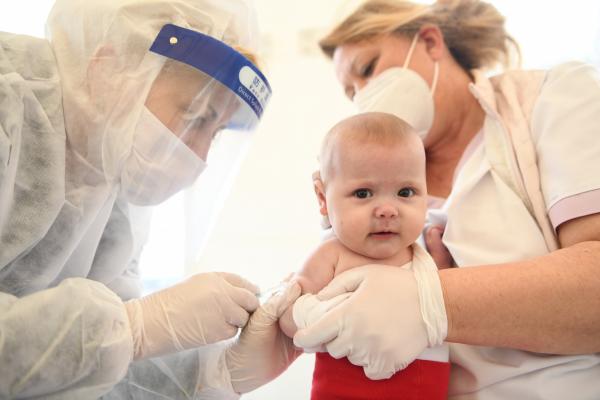
Child Immunization
The immune system of newborns are not well developed after birth, and they are exposed to several risks of illnesses that could lead to death.
It is therefore advised to get babies vaccinated against common diseases that affect babies such as measles, poliomyelitis and other life-threatening diseases.
However, some mothers have bad experiences getting their babies immunized and there’s now a mixed reactions to whether babies should be allowed for vaccinations or not.
For example, lump on a baby’s leg after vaccination, babies having cough after taking vaccines or babies getting congested taking vaccines and other baby immunization side effects.
Should I have my baby Vaccinated or Not?
Is vaccination really useful and necessary if you’ve done everything needed for your baby’s optimal development during pregnancy?
In some parts of Europe, nursing mothers are allowed to decide whether to get their babies vaccinated or not, and the interest of getting newborns vaccinated is decreasing.
In Austria for example, there is no compulsory vaccination, but it is recommended to have children from the 3rd month of life vaccinated against certain diseases.
In Africa, pregnant women that deliver their babies in some government hospitals are given compulsory vaccination where government health officials move from house to house to encourage nursing mothers to bring out their babies for immunization.
It is important to get babies vaccinated since they’re easily exposed to viruses and bacteria that cause infections everyday and they do not have the strong immune system to fight some of these infections.
Also, life-threatening complications and long-term consequences can occur due to their early exposure to germs.
If proper health record of the mother and that of the baby is taken, and the healthcare workers follow the best practices, then the possible side effects can be greatly minimized.
What Diseases can/should my Baby be Vaccinated against?
In almost all parts of the globe, a day old baby and children of not more than 10 years are immunized against certain infectious diseases at intervals, and it’s usually at no cost to the mother.
The costs for vaccinations against the following diseases are usually covered in the US and in other countries
- Poliomyelitis
- Hepatitis B.
- Diphtheria
- Rotavirus diarrhea
- Whooping cough
- HPV infection – human papillomavirus
- Meningococcus
- Tetanus
- Pneumococci
- Haemophilus influenzae
- MMR ( measles, rubella, and mumps )
The vaccination against the above-mentioned diseases is usually carried out on a year baby and further doses can be given again at different intervals.
Many vaccines are combination vaccines, so immunization against multiple infectious diseases can be achieved with a single vaccination.
Benefits of Getting Babies Vaccinated
Even with the mixed reactions on whether vaccination should be taken or not, there are benefits of vaccination or immunization for babies that can not be waived.
One of the importance of childhood vaccination is the best possible protection from dangerous diseases it offers children right from infancy.
Vaccines are among the safest drugs and are well tolerated by babies and children, and serious side effects are very rare.
The most important vaccine is DTaP which helps to prevent tetanus, diphtheria, and pertussis but there are other important ones too to take against hepatitis B, pertussis, IPV, Hib, PCV, MCV, and RV.
The acquired protection against the deadly diseases outweighs the extremely low risk of taking these vaccines.
In addition to protecting the vaccinated baby against diseases, vaccinations are also given to help to eradicate certain diseases. For example, polio is no more common unlike 2 decades ago.
Immunization also helps to stop the spread of some diseases, so when your baby is vaccinated, the spread of the pathogens causing diseases can be stopped and more lives can be saved, even those who’re not vaccinated.
Baby Vaccination Side Effects
The vaccination critics argue that, though rarely, serious side effects can occur after a vaccination.
The 1 year injection side effect can occur in 1 week later after taking it. Even the 6-in-1 vaccine react negatively in some babies.
Common side effects of baby vaccinations are abscesses, seizures, allergic reaction, or respiratory problem.
It is also claimed that vaccinations weaken the immune system of children and thus increase the risk of allergies.
To date, there are hardly any independent studies on the long-term effects of vaccinations, either taken in the first day life, first 3 month or at between 9 month to 1 year of the baby.
Also, some people criticize the effectiveness of these vaccines, as they think that the increase in antibodies in the blood that can be recorded after vaccination can not be equated with acquired vaccination protection.
Vaccines are standardized, but everyone reacts differently. For this reason, vaccines are usually well tolerated by most people, but in individual cases, they can lead to allergic reactions due to the additives in the vaccine serum.
Conclusion
We recommend vaccinations against diseases that can be severe, such as diphtheria, whooping cough, tetanus, hepatitis, and measles.
Everyone should decide for themselves whether vaccination against rubella, chickenpox, and mumps, which very rarely lead to complications in childhood is necessary.





